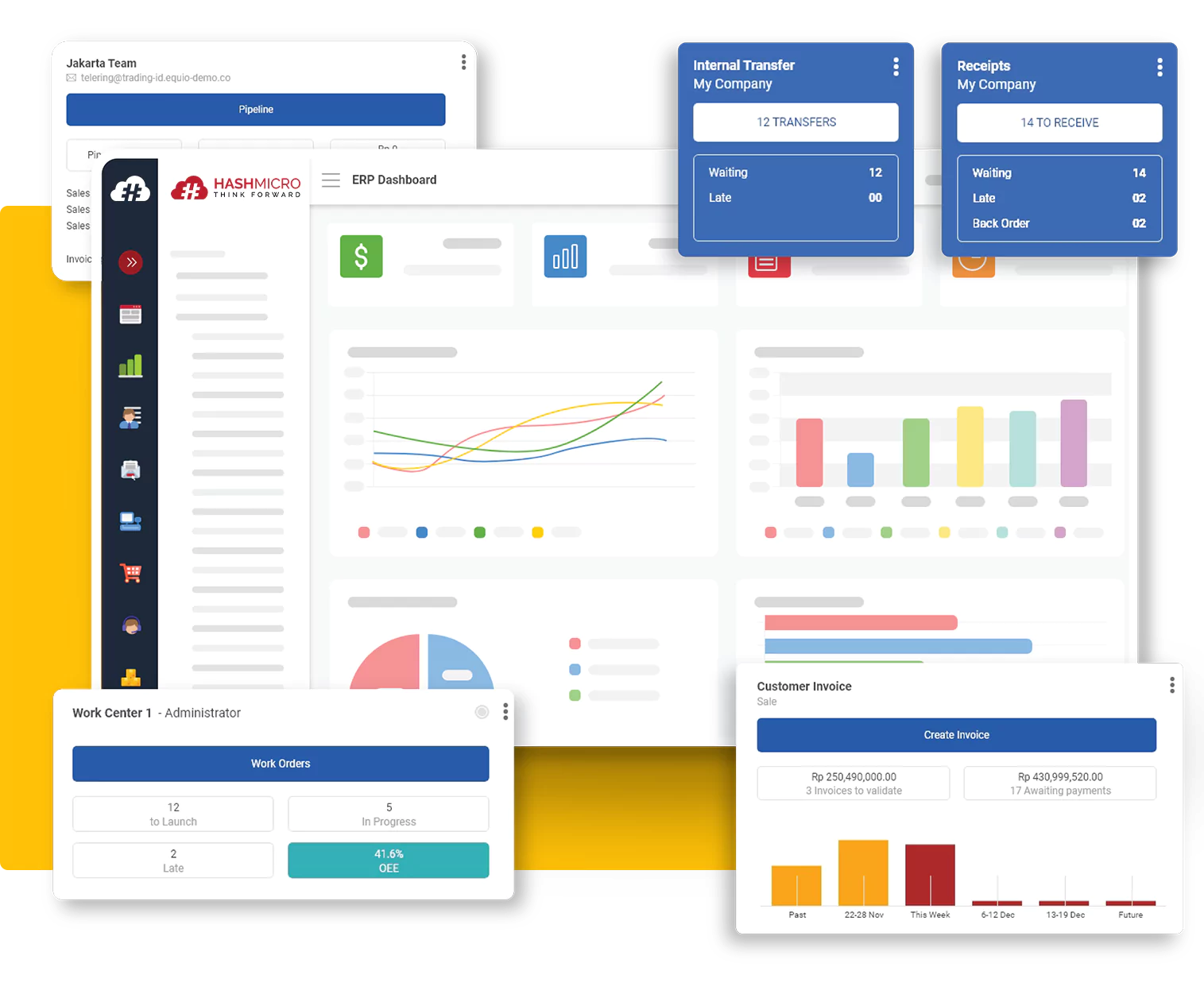Running my business without a centralized system used to be chaotic, data scattered across departments, duplicated files, and endless manual updates. I soon realized that without ERP for business, I was wasting time fixing mistakes instead of driving growth.
The frustration pushed me to look for a better way to manage everything in one place. That’s when I discovered ERP software, a system that automates tasks, connects every team, and gives me real-time insights to make smarter decisions.
If you’ve faced the same struggles, you’re not alone. Keep reading to learn how ERP software can transform the way you manage your business and unlock its full potential.
Key Takeaways
|
What is ERP?
ERP (Enterprise Resource Planning) is an integrated software system designed to manage and automate core business processes such as finance, inventory, HR, and procurement. It provides a centralized platform that helps businesses improve efficiency, accuracy, and collaboration across all departments.
ERP for business are used by organizations of all sizes across various industries like manufacturing, retail, construction, and services. They are especially valuable for companies looking to streamline operations, reduce manual work, and make data-driven decisions.
ERP Benefits for Business

Implementing ERP software offers numerous advantages that help businesses operate more efficiently and strategically. By streamlining workflows and centralizing data, companies can make better decisions and minimize costly errors.
The key benefits of ERP for businesses are:
- Improved efficiency: Automates repetitive tasks, reducing manual workload and boosting overall productivity.
- Better resource planning: Helps allocate resources effectively from the start, minimizing rework and misalignment.
- Early problem detection: Trial runs allow teams to identify and resolve software issues before full implementation.
- Enhanced decision-making: Provides real-time insights for quicker, data-driven business decisions.
- Scalable growth: Offers flexibility for businesses to adapt and expand without disrupting operations.
Below are the table of the benefit of ERP for business:
| Benefits | Description |
| Improved efficiency | Automates repetitive tasks to reduce manual workload and increase overall productivity. |
| Better resource planning | Allocates resources effectively from the start, minimizing rework and process misalignment. |
| Early problem detection | Enables trial runs to identify and fix software issues before full implementation. |
| Enhanced decision-making | Delivers real-time insights that support faster, data-driven decisions. |
| Scalable growth | Provides flexibility for businesses to adapt and expand without disrupting daily operations. |
Read more: Revolutionize Poultry Processing with ERP Software Solutions
Cloud-based ERP for Business
Choosing between a conventional ERP and a cloud-based ERP depends on your business needs and budget. Traditional ERPs offer extensive customization and strong data security but come with high upfront costs, longer updates, and IT maintenance requirements.
Cloud-based ERPs, on the other hand, are more affordable and easier to manage through subscription plans. According to the Grand View Research study, the global cloud ERP market was valued at USD 34.83 billion in 2023 and is projected to reach USD 110.26 billion by 2030, growing at a CAGR of 18.0%.
Also read: 5 Effective Strategies to Manage Construction Equipment
Important Considerations When Choosing an ERP

Since the company is still growing, workflows may not be fully defined and costs must be managed carefully. A cloud-based ERP offers an affordable way to organize operations early on. By launch time, processes and data are already streamlined and ready to scale.
1. Choose from experienced players in the industry
Choose an ERP vendor experienced in your industry to ensure smoother implementation and optimized workflows. Their systems already include compliance features like tax, PF, and TDS, with automatic updates for any new government regulations.
2. Understand the business process
The ERP must selected with the promoter(s) and an industry expert within the organization to achieve. The industry expert will know how the business works or the process flow involved. The promoters need to understand the importance of the ERP and agree to the cost incurred in investing in it.
3. Cost does matter
While cloud-based ERPs are more affordable upfront, they still contribute significantly to operating expenses. It’s crucial to choose a solution that fits your budget early on, as switching to another ERP later can be costly and time-consuming for your team.
4. Take only what your require.
Do not complicate the processes by subscribing to unnecessary modules of an ERP just because the vendor pushed it hard. The additional cost and resources should the company spend on improving use anyway, such as digital marketing and SEO (Search Engine Optimization).
5. Keep the ends open
Only subscribe to essential ERP modules, but ensure the system allows easy expansion as your business grows. For instance, a manufacturing ERP should support adding sales or POS modules later to adapt to evolving operations.
Also read: 7 Main Benefits of ERP Software in the Wholesale Industry
6. Plan for the ERP
Both cloud-based and on-premise ERPs need dedicated personnel to manage data and security. However, cloud ERPs are simpler and require only one or two trained users, while on-premise systems demand a full IT team and infrastructure to maintain and customize.
Transform Your Operations with HashMicro ERP Software

HashMicro ERP Software empowers businesses to simplify complexity and unify every workflow under one intelligent system. Its automation, analytics, and AI capabilities help you run operations seamlessly while focusing on strategic growth and long-term success.
Key features of HashMicro ERP Software:
- Built-in Business Intelligence (BI): Offers real-time analytics and detailed reports to support data-driven decisions.
- AI integration: Enhances automation and accuracy with predictive insights powered by artificial intelligence.
- Access-level control: Protects sensitive information by assigning specific permissions to each user role.
- Mobile apps: Allows you to monitor and manage operations anytime, anywhere through a smartphone or tablet.
- Flexible hosting (on-premise/cloud): Lets you choose between local installation or cloud deployment based on your business needs.
Conclusion
ERP software has become the backbone of modern businesses, enabling seamless collaboration across departments and improving decision-making through real-time data. With the right system, companies can eliminate silos, reduce manual work, and achieve higher operational efficiency.
HashMicro ERP Software offers an all-in-one, AI-driven solution tailored to diverse industries. Its comprehensive modules, from accounting and inventory to HR and CRM, help businesses optimize workflows and scale effortlessly.
If you’re ready to experience a smarter way to manage your business, HashMicro is the right choice. Book a free demo today and discover how automation can transform your daily operations into long-term success.

FAQ About ERP for Business
-
Is Excel considered an ERP system?
No, Excel isn’t an ERP system. While ERP software unifies all business operations under one integrated platform, Excel relies heavily on manual input. Different departments may use separate spreadsheets with duplicate data, increasing the risk of inconsistencies and human error.
-
Will AI replace ERP systems?
AI won’t replace ERP systems—it will enhance them. Artificial intelligence is transforming ERP by automating manual tasks and improving decision-making, reducing the workload once handled through fragmented, manual processes.
-
What are the main types of ERP systems?
ERP systems generally come in four types: on-premises, cloud-based, hybrid, and multicloud. Each model offers different advantages in terms of cost, scalability, and collaboration, so businesses must choose the one that best aligns with their growth strategy.































